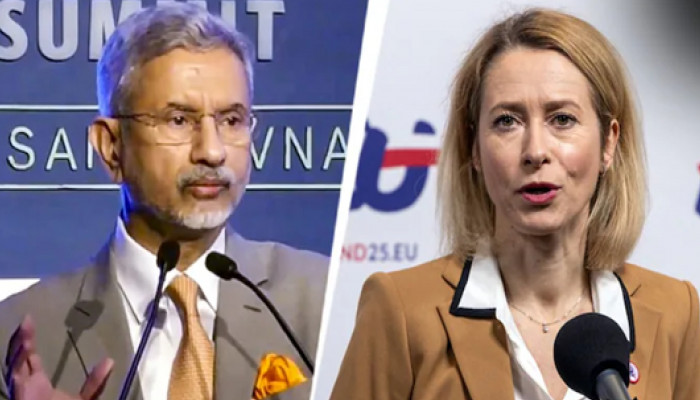Experts calls out EU's double standards on Pahalgam attack, cites Jaishankar’s remark
- In Reports
- 04:47 PM, May 03, 2025
- Myind Staff
Experts and social media users have criticised the European Union for being hypocritical in its approach to the tensions between India and Pakistan, comparing it to how it responded to the Russia-Ukraine war.
Kaja Kallas, the EU's top diplomat, urged both India and Pakistan to show restraint, but many experts have criticised her for trying to remain neutral, pointing out a comment made by India's External Affairs Minister, S. Jaishankar, in 2022 about "Europe's problems." This remark highlighted how the EU’s response to the situation in South Asia seems inconsistent with its reaction to the Ukraine conflict. On Friday, Kallas had separate calls with Jaishankar and Pakistan’s Deputy Prime Minister Ishaq Dar as tensions between the two countries rose following the deadly Pahalgam terror attack, which killed 26 people. Kallas shared her thoughts on X, stating that the situation’s escalation benefits no one, although she didn’t directly blame Pakistan for supporting cross-border terrorism, an issue that India has faced for many years.
"I urge both sides to show restraint and pursue dialogue to ease the situation. Escalation helps no one," Kallas, who is the EU's High Representative for Foreign Affairs, said on X. However, foreign policy experts and some people on social media quickly called out Kallas for being hypocritical. They found her old posts about Russia’s invasion of Ukraine, where she said that "defence is not provocation" and stressed the need to "stop the aggressor". "I hope Europe learnt that appeasement only strengthens the aggressor. The aggressor will never stop unless he is stopped," Kallas had posted while calling for action against Russia.
In another post, Kallas defended Europe's military backing of Ukraine, saying "defence is not provocation". "Fear of escalation creates self-deterrence. As a result, some argue that helping Ukraine defend itself from aggression means to escalate. Defence is not provocation," she had said.
Summing up the situation, a foreign policy lecturer tweeted, "To be clear, most Indians have rarely expected Europe to do much about Pakistan, considering its historical record." The European Union (EU) is Pakistan's second-largest trading partner, and its relationship has remained strong over time. Kallas's statement was described as "purposeless" and "ineffectual" by another foreign policy specialist. "Feels like a return of the hyphenated India-Pakistan era with this statement from Brussels," he stated.
A senior ORF fellow pointed out that the statement reflects the EU's lack of understanding of the situation, as "dialogue and diplomacy" have not been effective in stopping cross-border terrorism from Pakistan. "If you had any knowledge, you would know dialogue and diplomacy has been done to death (the death of Indians at the hands of Islamist Pakistani terrorists) and you have blithely turned a blind eye to the shenanigans of the Islamic State of Pakistan. Please do tell us what dialogue and diplomacy has achieved so far?" Sushant Sareen said on X.
Oliver Blarel, a visiting fellow at Carnegie, expressed disappointment with Europe's "equidistant approach" to the problem. "It shows lack of knowledge (India has shared Xth times dossiers to Pakistan after such acts, to no avail) and sensitivity (asking India to just wait arms crossed is a non-starter)," Blarel wrote on X. Some people pointed to Jaishankar's 2022 statement when Europe tried to persuade India to adopt a firmer stance on the Russian invasion of Ukraine.
"Europe has to grow out of the mindset that its problems are the world's problems, but the world's problems are not Europe's problems," Jaishankar said at a conference in Bratislava. The minister made strong remarks following signals from some European countries suggesting that India's neutral stance on Ukraine might affect global support for the country, especially if tensions with China escalate.







Comments